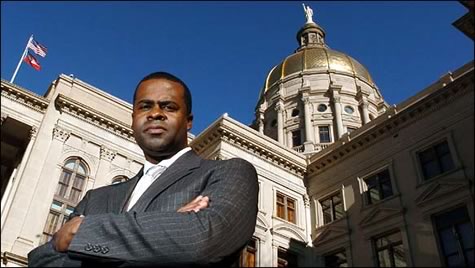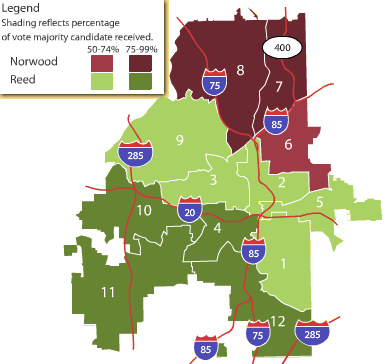Posted December 25, 2009
On December 15, the Atlanta branch of Solidarity hosted “Atlanta’s Post-Election Reflection: What’s Next?” Featured speakers, from Malcolm X Grassroots Movement, Black Agenda Report, and a local community safety organization, provided perspectives on what the last election round meant for the city and for our work.

Atlanta mayor, Kasim Reed
The well-attended “reflection” was originally inspired by an article written by one of our featured speakers, Bruce Dixon, managing editor of Black Agenda Report. The article, provocatively titled “The End of Black Politics as We Knew It: Will Atlanta’s Next Mayor Be White or Should We Even Care?” can be found here. Without a doubt, the decisive factor in Atlanta’s mayoral election was race. This wasn’t a surprise to anyone, but it was resoundingly confirmed in the post-runoff polling data. In majority Black districts, mayor-elect Kasim Reed won considerable support. Mary Norwood, his white contender, only performed well in North Atlanta, which is mostly white and much more affluent.
Put together a close race (it was 50.4% to 49.6%) and a city growing whiter and it’s not at all difficult to imagine a white mayor winning the next election. Most Atlantans will tell you that this scenario would have been unimaginable 10 or 20 years ago, ever since white folks moved out of the city (leaving few resources behind) and a new generation of Black leaders emerged to win control of what was left. These leaders were fruits of a Black business class that had historically favored slow, ameliorative reforms to the apartheid system known as “Jim Crow.”
Rather than open opposition to the white power structure of the city, backroom dealing with liberal elements in the Chamber of Commerce was preferred. After all, a “Little Rock” situation had to be avoided at all costs, if only because it made investment and “business as usual” difficult. This strategy, which became known as “the Atlanta Way,” was opposed by radical elements of the Black freedom movement such as SNCC and the working class Black residents in the Summerhill and Dixie Hills neighborhoods that rioted in 1966-7. Nonetheless, political office (if not real power) was handed over from the Metro Atlanta Chamber of Commerce gang to younger Black leaders who would continue a similar path of development for the city.
Over 30 years later and we’re now seeing racial migration trends reverse as more affluent whites come to occupy spaces and positions previously held by Blacks. Working class Black residents have been pushed out of the city at an alarming rate. Principal reasons for this are 1) the neoliberal assault that has been facilitated by all political elements unwilling to challenge capital (i.e.- Democratic Party, “Atlanta Way” proponents), 2) the tidal wave of foreclosures that has hit what remained of the Black “middle class” in recent years, and 3) developer efforts to attract wealthier (and whiter) consumers to the city. While the political nuances may take different shape from city to city, this scenario is playing out across the United States.
The local shape of this scenario was outlined in the course of the last mayoral race. What we see is the anticlimactic dénouement of a strategy for Black uplift that was modeled too much on the “Atlanta way.” As Bruce Dixon notes, the racial wealth gap in Atlanta is among the highest in the nation, with whites owning an average of four times as much as Blacks. This reality, he concludes, is the logical conclusion to any strategy underpinned by an alliance with capital. Such an alliance will inevitably prevent the construction of a platform in the interest of working people. The resulting failure to craft a platform that corresponds to the needs of working people has been profound. Not only has the base of Black politicians materially disintegrated–through working class Blacks being pushed to the periphery of the city–but it has also disintegrated due to general lack of appeal.

Runoff voting turnout: mainly white north Atlanta went overwhelmingly for the white candidate, Mary Norwood
There was nowhere near “Obama level” of enthusiasm on November 3, with less than 30% of the electorate voting. A unusually well-attended runoff, with turnout that matched the regular election, had more to do with anxiety over a Norwood victory than any other factor. Voter turnout on the North side was much higher than that of the South side for both elections, perhaps an indication that more affluent whites see this as an opportunity to “take back the city” (as they will often say, despite owning a disproportionate amount of it already)–and, truthfully, it is exactly that, an opportunity that was handed to them on a silver platter by the “Atlanta Way” Democrats.
Whether or not the wealthy North side regains political office in the next election, it’s clear to critical observers that they already grasp the reigns of power and have for some time. It was fundamentally their strategy that privatized Grady Hospital (the formerly public “safety net” hospital in Atlanta), that razed public housing more completely than in any other major city, that has initiated repeated attacks against homeless people downtown, and so on. They are profiting and will continue to profit from this course. The “Atlanta Way” Democrats, like Kasim Reed, will profit in the short term as facilitators. After all, these are “safe” Black leaders who have demonstrated incredible commitment to capital for decades. In the long term, however, their result will be political extinction for themselves and the rise of a new openly conservative, white political establishment. Working class and Black Atlanta has nothing to gain here and too much to lose.
This is why the speakers from Black Agenda Report and Malcolm X Grassroots Movement voiced solid appeals to creating and supporting alternatives to this dying breed, whether it be the Green Party (as Bruce Dixon mentioned) or other political instruments. In addition to organizing new institutions for struggle, they also called for our forces to take up issues that will never sufficiently be on the agenda of the Democratic Party, such as mass Black incarceration and public housing.
As usual, the over-two hour discussion was wide-ranging yet too short to fully express all the challenges and possibilities for our cities in this period. That being said, the presentations served as great conversation starters. We hope you check them out here and comment below!
